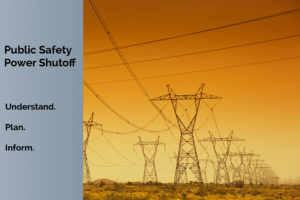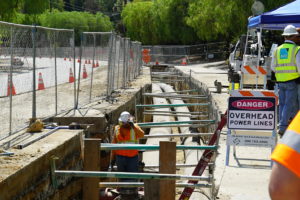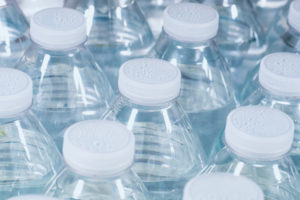What are public safety power shutoffs?

Regulations by the California Public Utilities Commission authorize energy companies to turn off power to avoid or reduce the risk of wildfires.
Known as a Public Safety Power Shutoff, this safety precaution could impact a water utility’s ability to provide water service to its customers, as water systems rely on power to supply water to their customers. We are providing this information to inform our customers of the steps Cal Water is taking to keep the water flowing in the event of a power shutoff as well as tips for our customers on how to stay informed and prepare as best you can if a power shutoff occurs in your community.
What is a Public Safety Power Shutoff?
Power shutoffs are an operational practice where energy companies turn off power to prevent the start and spread of wildfires. Local energy companies make the decision to turn off power by monitoring local fire danger conditions and considering weather and environmental factors. A power shutoff could mean no electricity for a long duration and wide expanse. Once high-threat conditions pass, energy companies will re-energize affected lines after inspection to ensure safety.
Mother Nature has a mind of her own—so every situation is unique. But, Cal Water is committed to being as prepared as possible to minimize any potential water system impacts to our customers, as a power shutoff may affect one or more communities served by us.
What is Cal Water Doing to Prepare for a Power Shutoff?
Being prepared for a power shutoff takes careful planning, which begins by designing our water systems the right way and working with local fire agencies and energy companies to ensure community safety.
Whenever a power outage or shutoff occurs, we put our emergency response training to good use. This means activating our Emergency Operations Center and bringing in our operational, engineering, water quality, and other experts and resources statewide—including portable generators, booster pumps, and emergency trailers—to keep water flowing to our customers and communities.
But, there’s more to it than that. We go to great lengths beyond our standard procedures to ensure water service isn’t disrupted during a power shutoff. Cal Water has been installing permanent generators at a number of our critical stations over the years, and we are working to bring in additional, portable generators for other stations. Our crews and employees have also been trained on emergency response procedures for when these widespread shutoffs occur.

How Will I Know if a Power Shutoff Notice Has Been Issued?
Power shutoffs can happen quickly. When possible, the electric companies will notify us, and we will provide our customers with important updates about the water system and their water service. We will attempt to reach customers through calls, texts, and emails using the contact information we have on file. We will also use calwater.com and social media channels, and we will keep local news media informed of any important updates.
To ensure you receive real-time alerts, update your contact information in your online customer account or at ccu.calwater.com.

What Can I Do to Prepare for a Power Shutoff?
We do not control how long a power shutoff might last, and while we’ll do everything we can to continue providing water service, a power shutoff could result in water service being interrupted in some cases, such as if we don’t receive enough advanced notice to mobilize resources or the shutoff lasts a longer period of time. Here are a few practical steps you can take right now, so you’ll be ready ahead of time if water service is interrupted:
- Store at least one gallon of water per day for each person and each pet. You should consider storing more water than this for areas with hotter climates, pregnant women, and people who are sick. Ideally, it’s best to have at least a three-day supply of water for each person and pet.
- Purchase commercially bottled water, keep it sealed, and replace it after its “use by” date.
- Purchase a food-grade water-storage container from a camping supply store, thoroughly clean and rinse it, and fill it with water in accordance with the manufacturer’s instructions.
- Store your water in a cool, dry place. If you are not using commercially bottled water, replace it every six months.
- Empty large, plastic soft-drink bottles (not milk or juice containers, because they may promote bacterial growth), thoroughly clean and rinse them, sanitize them with household chlorine bleach (one teaspoon of non-scented bleach to a quart of water, swished in the bottle so it touches all surfaces), rinse thoroughly with warm water, and fill to the top with tap water. Add two drops of non-scented liquid household chlorine bleach. Seal tightly using the original cap, being careful not to touch the inside with your fingers. Write the date on the outside of the bottle and store out of direct sunlight.
Get additional emergency preparedness tips.

What’s the Best Way to Stay Informed About My Water Service During Potential Power Shutoffs?
Update your contact information in your free, online customer account or at ccu.calwater.com. In the event of a power shutoff, we’ll post information, send emails, and even text alerts for real-time updates about your water service.
What’s the Difference Between a Power Outage and a Power Shutoff?
A power outage is when the electrical power goes out unexpectedly. This can be due to faults at power stations; damage to electric transmission lines, substations, or other parts of the distribution system; a short circuit; cascading failure; or even circuit breaker operation. A Public Safety Power Shutoff, on the other hand, is an operational practice where energy companies intentionally turn off power to avoid catastrophic wildfires. Local energy companies make the decision to turn off power by monitoring local fire danger conditions and considering weather and environmental factors.
How is Cal Water reacting to PSPS?
For additional information, read this article: Despite Public Safety Power Shutoffs, Water Service Continued to Flow.






